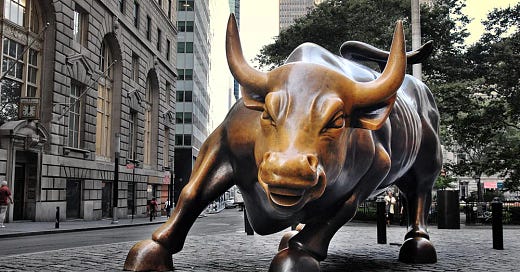There is no plan
Americans elected a mad king. Attempts to find a rationale for his wanton economic destruction are misplaced.
Uncertain waiting times feel longer than finite waiting times1. The anxiety of not knowing is simply too much for many of us to bear. That is why Disney cheerily informs guests how long it will be before they can ride on Space Mountain. Why Transport for London invests in dot matrix displays. And why Uber provides a little map detailing where your driver is. People really would rather wait for a longer, finite period of time than a shorter, indeterminate period.
This yearning for certainty is also why we are so keen to attribute a rationale where one might not exist. It is why so many economists, political pundits and partisans have been at pains to explain the logic – good, bad or certifiable – for Donald Trump’s tariffs. A policy that has, at the time of writing, wiped more than $5 trillion off the value of US shares in two days. Even if something awful is happening, at least let there be a reason.
To that end, I’ve done my best to compile a list of rationales, and where possible a reason why they are demonstrably false, or at odds with other apparent motives:
The tariffs are an attempt to reshore domestic manufacturing. Yet US factory construction is cratering and the administration has halted a $5bn initiative to build electric vehicle charging stations.
The tariffs are a negotiating tactic, a lever for the president’s genius for dealmaking. Yet if true, they cannot be a means of boosting investment and bringing back jobs in manufacturing.
The tariffs are about halting the flow of fentanyl and immigration at the border. Yet in 2024, U.S. Customs and Border Protection agents intercepted just 19kg of fentanyl at the US-Canada border.
The tariffs are an attempt to raise revenue, possibly to replace income tax. Yet this assumes Americans do not respond to higher prices by purchasing fewer goods, or that the wider economic damage does not lead to reduced consumer spending. Moreover, current revenues from import tariffs represent 1.8% of federal revenues, while the individual income tax comprises 49%. Writing for Cato, the economist Pierre Lemieux suggests that tariff revenues would have to rise by some 2,600% to cover the lost income tax revenue.
The tariffs are a means to boost national security. Yet Trump despises the CHIPS Act, a bipartisan law passed during the Biden administration which aimed to make the US less reliant on Asia for semiconductors. And there is no national security rationale for tariffing shoes from Vietnam or diamonds from Lesotho.
The tariffs are part of the plan for great power competition with China. Yet they will encourage both US allies and those currently on the fence to move closer to China’s economic orbit. Indeed, Southeast Asian countries are some of the hardest-hit by the tariffs.
The tariffs are part of the so-called Mar-a-Lago accords, the plan to reorient the global economic and financial systems by, amongst other actions, weakening the dollar. Yet Treasury Secretary Scott Bessent seems to be under the impression that the policy is to have a strong dollar and there is no appetite to undermine the Greenback as the global reserve currency.
Here’s a thought. What if there is no rationale at all? What if the President of the United States simply believes – and has believed for decades – that any trade deficit is evidence of foreign malfeasance. What if he thinks that reciprocity – the basis of the global trading system – is for chumps? What if Americans elected a mad king, and no one – not his advisors, not the Republican-led Congress, not the courts – will stop him? Because they fear the repercussions of doing so, which include the threat of violence.
What if Donald Trump loves tariffs, and now we all have to wait patiently for the results?
Read this brilliant piece by David Maister, on The Psychology of Waiting Times






The belief that there is no plan, no alternative if the tariffs create more problems than they solve, no Plan B to cater for the fallout which is usually in an area totally removed from the target area, “the law of unintended consequences “. Trump won because 1.5% of voters thought he was the better option. I wonder what they are thinking today?
If Trump was a teenager we could say he was just “attention getting “ but ?